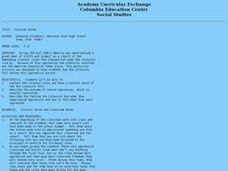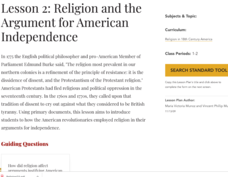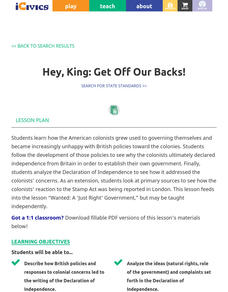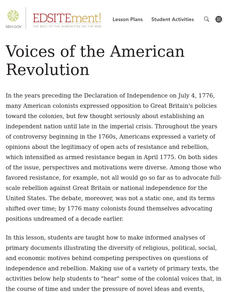Curated OER
Colonial Rules
How did Colonists react to British rule prior to the American Revolution? Give your high schoolers a taste of oppression with this role-play activity, then let them come up with a revolution of their own. This excercise is intended to...
Jamestown-Yorktown Foundation
Why Did Some Colonial Virginians Continue to Support the King?
Not all colonials supported the American Revolution. A resource from the American Revolution Museum at Yorktown ask young historians to investigate the reasons why some colonial Virginians were loyalist and continued to support King...
National Endowment for the Humanities
Lesson 2: Religion and the Argument for American Independence
Young scholars examine how religion affected arguments justifying American independence. They read and analyze primary source documents, and write an essay analyzing how Americans used religious arguments to justify revolution against a...
US House of Representatives
Hispanic Americans in Congress During the Age of U.S. Colonialism and Global Expansion, 1898–1945
New ReviewTo be Puerto Rican, in the words of one politician, is to be "foreign in a domestic sense." Young historians consider the American role in colonialism and its impacts on Hispanic Americans through the first part of the twentieth century...
Curated OER
Colonial Trades and Apprenticeships
Students examine and analyze culturally significant objects from colonial Boston. They construct a story around the life and work of Nathaniel Hurd from a list of keywords excerpted from a passage about Nathaniel Hurd. In addition, they...
Curated OER
Interpreting Foundation Documents of the American Republic
Explore early American documents that qualify as primary sources. Tenth and eleventh graders use the provided worksheets to analyze the texts of the Articles of Association, the Declaration of Independence, the Articles of Confederation,...
Curated OER
The American War for Independence
Students complete a unit of lessons that examine the goals of the Americans during the Revolutionary War. They explore an online interactive map of major campaigns, read and analyze primary source documents, and analyze diplomatic and...
Curated OER
Creating a Cartoon of the Philippine-American War
During the Industrial and commercial expansion of the United States, war broke out between America and the Philippines. Explore conflict, American Imperialism, and political cartoons with this creative project. Learners view the film,...
National Endowment for the Humanities
Empire and Identity in the American Colonies
The American Revolution was born out of a European conflict that spilled over into North America—and the documents prove it! Using primary sources from the era of the French and Indian War, including British plans to try to unite its...
Curated OER
Colonial New York Slave Codes: Law and Order
Build a historical perspective from four different points of view. Young historians take on the role of a slave-owning white person, non-slave owning white person, slave, or free African-American person and imagine what life would be...
Curated OER
Comparing SLaves and Servants in Colonial New York
Young historians compare and contrast differences in the laws that regulated the activities of slaves and servants. They review and analyze a series of primary source documents to explain the social constructs related to slaves and...
North Carolina Consortium for Middle East Studies
Missing Pieces of the Puzzle: African Americans in Revolutionary Times
What's missing from most studies of the American Revolutionary War is information about the role African Americans played in the conflict. To correct this oversight, middle schoolers research groups like the Black Loyalists and Black...
iCivics
Hey, King: Get Off Our Backs!
Young historians explore the reason American colonists were unhappy under British rule. Class members complete hands-on activities and participate in a group discussions to understand why colonists drafted the Declaration of Independence.
Jamestown-Yorktown Foundation
What Was Everyday Life like in Colonial Virginia?
After reflecting on jobs people perform in the present day, scholars discuss what they believe jobs would have been like in Colonial Virginia during the American Revolution. Small groups then perform a jigsaw using informational packets....
Curated OER
Colonial New York Slave Codes: Pedro's Walk
Look critically at the slave laws instated in Colonial New York. Your class examines primary source documents, slave laws, a narrative account from a slave's perspective, and Slave Codes. They write diary or journal entries in response...
Elizabeth Murray Project
The Education of Women in Colonial America
What educational opportunities were available to women during the colonial era in American history? How did the opportunities available to women differ from those for men? To answer this question, class members examine a series of...
Museum of the American Revolution
Dissecting the Declaration
Delve into the past to understand the issues that led to the Declaration of Independence. Academics read excerpts from the Declaration of Independence and take a virtual tour of the American Revolution Museum. The resource explains how...
Curated OER
Choosing Sides: The Native Americans' Role in the American Revolution
Students analyze the different roles assumed by various Native American tribes during the American Revolution. They examine the issues involved for Native Americans in choosing the British or the American side of the conflict, such as...
Curated OER
Voices of the American Revolution - Primary Documents
High schoolers use primary documents to examine the attitudes and positions of several factions leading up to the American Revolutionary War. They read documents, debate differing perspectives and write an essay exploring the reasons for...
Jamestown-Yorktown Foundation
Why Did Some Colonial Virginians Seek Independence?
To understand the reasonings of those colonials who sought independence from England, young historians are divided into content groups that examine documents related to either the Boston Tea Party, the Yorktown Tea Party, Tea Overboard,...
Curated OER
Lesson 1: English-Indian Encounters
What did the English settlers think of the Native Americans inhabiting the Chesapeake region of the United States? Learners analyze a series of documents and images to determine the English perception of the local inhabitants. A great...
US House of Representatives
Exclusion and Empire, 1898–1941
New ReviewOften forgotten and written off as the model minority, Americans with heritage in Asia and the Pacific Islands have played an essential role in American history, including Congress. Budding historians reclaim history by researching the...
Curated OER
Harvesting the New World: Changing Land Uses and Contact Between Cultures in Colonial Times
Ninth graders differentiate the Native American and European values. In this world history lesson, 9th graders define colonialism in their own words. They study the effects of epidemics and other diseases to Native American populations.
Curated OER
Lives of Native Americans and Settlers
Students assess the effect of contact between the Native Americans and Europeans after 1492. They explore the lives of the early European colonists and the Native Americans living along the East Coast of North America. Lesson contains...
Other popular searches
- The American Colonists
- Early American Colonists
- American Colonists Hardships
- Native American/colonists

























